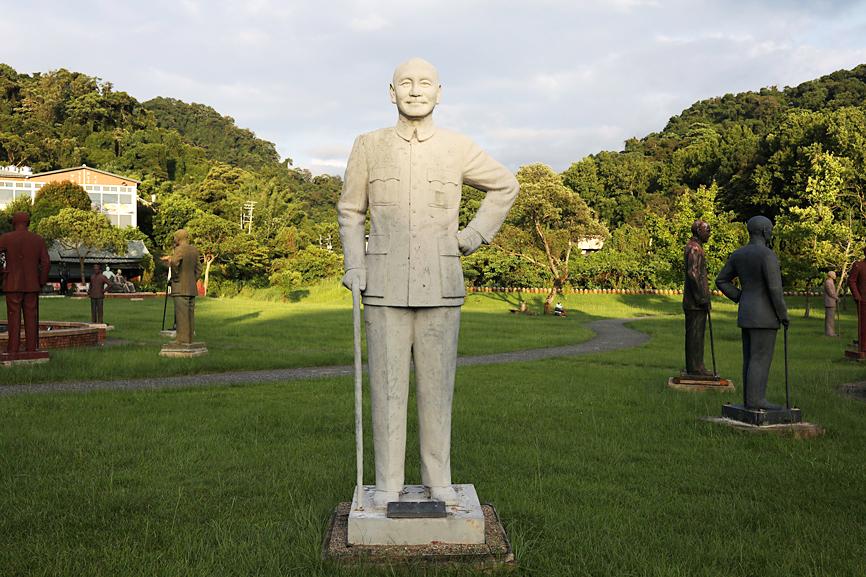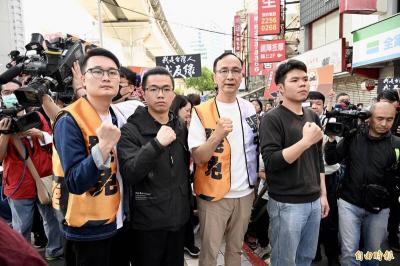As of this month, 54 organizations have completed plans to remove, or have already removed, icons of authoritarian rule from public spaces in compliance with the Transitional Justice Commission’s regulations.
The Central Police University and the Taiwan Police College have agreed to rename their Zhongzheng halls, while the college also plans to remove two statues of former president Chiang Kai-shek (蔣介石).
The Executive Yuan’s Central Taiwan Joint Services Center moved a statue of Chiang to Taoyuan’s Cihu Memorial Sculpture Park, while a statue at Taian Service Area in Taichung, the largest statue at a rest station on a national freeway, is to be removed next year, the source said.

Photo: Ann Wang, Reuters
The statue of Chiang at Chiayi County’s Jhaoping Station has been removed, while three statues at the Ministry of Justice offices in New Taipei City, Taoyuan and Changhua County have been removed, the commission said.
The Zhongzheng Building under the Ministry of Civil Service’s Muzha Office in Taipei’s Wenshan District (文山) would be renamed and its plaque would be removed this summer, the commission added.
Fourteen statues of Chiang Kai-shek and two portraits of former president Chiang Ching-kuo (蔣經國) at companies affiliated with the Ministry of Economic Affairs have been removed, while a half-bust of Chiang Kai-shek has been repurposed as a windmill, the commission said.
A statue of Chiang Kai-shek at the Chiayi County Tourism Bureau has been blocked from sight with a display panel, while the statue of him at Taitung County Airport was removed last year, the commission said.
Five of his statues at Coast Guard Administration bases — three at Kaohsiung bases, and one each in Taoyuan and Taitung — were removed, while the name Zhongzheng was struck from platforms at the bases, the commission said.
The Fishery Agency has put into storage a Chiang Ching-kuo relief originally featured in its Keelung office, the commission said.
Three statues of Chiang Kai-shek at homes for elderly people under the Ministry of Health and Welfare were removed, the commission said.
The commission did not arbitrarily state how the statues should be handled, and most of the methods were proposed by the respective agencies, Commissioner Deputy Director Yeh Hung-ling (葉虹靈) said.
Except for the Ministry of National Defense, the Veterans Affairs Council and the Ministry of Education, there are still 38 places where “icons of authoritarian rule” remain unprocessed, Yeh said.
The commission would continue to work with governmental agencies and convey to them what transitional justice symbolizes and how they could implement it, Yeh said.

The Ministry of Economic Affairs has fined Taobao NT$1.2 million (US$36,900) for advertisements that exceeded its approved business scope and ordered the Chinese e-commerce platform to make corrections in the first half of this year or its license would be revoked. Lawmakers have called for stricter supervision of Chinese e-commerce platforms and more stringent measures to prevent China from laundering its goods through Taiwan as US President Donald Trump’s administration cracks down on origin laundering. The legislature’s Finance Committee yesterday met to discuss policies to prevent China from dumping goods in Taiwan, inviting government agencies to report on the matter. Democratic Progressive Party

Taiwan and its Pacific ally Tuvalu on Tuesday signed two accords aimed at facilitating bilateral cooperation on labor affairs, according to Taiwan’s Ministry of Foreign Affairs (MOFA). The governments inked two agreements in Taipei, witnessed by Foreign Minister Lin Chia-lung (林佳龍) and visiting Deputy Tuvaluan Prime Minister Panapasi Nelesone, MOFA said in a news release. According to MOFA, the agreements will facilitate cooperation on labor issues and allow the two sides to mutually recognize seafarers’ certificates and related training. Taiwan would also continue to collaborate with Tuvalu across various fields to promote economic prosperity as well as the well-being of their

Taiwan would welcome the return of Honduras as a diplomatic ally if its next president decides to make such a move, Minister of Foreign Affairs Lin Chia-lung (林佳龍) said yesterday. “Of course, we would welcome Honduras if they want to restore diplomatic ties with Taiwan after their elections,” Lin said at a meeting of the legislature’s Foreign Affairs and National Defense Committee, when asked to comment on statements made by two of the three Honduran presidential candidates during the presidential campaign in the Central American country. Taiwan is paying close attention to the region as a whole in the wake of a

The Taipei District Prosecutors’ Office has continued its investigation into allegations of forged signatures in recall efforts today by searching the Chinese Nationalist Party’s (KMT) city chapter and questioning several personnel including the chapter director, according to media reports. Among those questioned and detained were KMT Taipei chapter director Huang Lu Chin-ju (黃呂錦茹), chapter secretary-general Chu Wen-ching (初文卿), chapter secretary Yao Fu-wen (姚富文) and first district committee executive director Tseng Fan-chuan (曾繁川). Prosecutors said they would not confirm reports about who had been summoned. The investigation centers on allegations that the ongoing recall campaigns targeting Democratic Progressive Party legislators Rosalia Wu (吳思瑤)